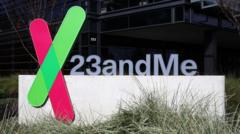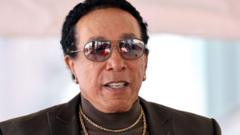23andMe, once a booming DNA-testing service, now confronts significant challenges as its stock price plummets and leadership turmoil mounts, raising concerns about the future of its vast genetic database.**
23andMe Faces Uncertainty Amidst Volatile Market and Privacy Concerns**

23andMe Faces Uncertainty Amidst Volatile Market and Privacy Concerns**
The once-prominent DNA-testing company grapples with declining share prices and questions about the safety of sensitive customer data.**
In a dramatic shift from its peak success, DNA-testing company 23andMe is facing a battle for survival as its market value collapses. Three years ago, the firm was celebrated for transforming the genetic landscape with millions of customers eagerly submitting saliva samples in exchange for insights into their ancestry and health risks. At its height, 23andMe boasted a share price exceeding $321, far eclipsing industry giants like Apple. However, that figure has since dwindled to an alarming $5, leaving the company at risk of delisting from stock exchanges.
The decline of 23andMe raises critical concerns surrounding the safety of sensitive genetic data that the company has gathered over the years. When approached for comment, 23andMe reassured stakeholders of its commitment to data privacy, asserting it would maintain a focus on customer confidentiality. However, the question remains: how did such a beloved company end up in such dire straits?
Initially, 23andMe experienced a surge in popularity, partly due to endorsements from celebrities like Snoop Dogg and Oprah Winfrey, and many users reported life-altering discoveries through their genetic tests. But despite its success, the company's business model proved unsustainable. Professor Dimitris Andriosopoulos from Strathclyde University notes that after the initial purchase, customers had little reason to return. Additionally, the much-anticipated monetization of an anonymized DNA database for pharmaceutical research has yet to materialize.
The turmoil within 23andMe's leadership has compounded its troubles. After a mass resignation of its board earlier this year, only co-founder and CEO Anne Wojcicki remains from the original leadership team. Speculation about the company's future has intensified, with suggestions that it might soon be forced either to sell or close its doors.
In response, Wojcicki has publicly stated intentions to take the company private and has dismissed rumors of a third-party acquisition. Still, concerns linger, especially from competitors. Ancestry has called on U.S. regulators to keep a close watch should 23andMe go up for sale.
The implications of 23andMe's potential downfall extend beyond corporate interests. Experts warn of the unique risks associated with DNA data, as it holds implications not only for individual users but also for their biological relatives. Carissa Veliz, author of "Privacy is Power," emphasizes the need for stringent protections, given that individuals who submit their DNA are effectively sharing genetic data for their entire family tree, often without consent.
Despite these worries, 23andMe insists that all customer data protections will remain intact, regardless of any ownership changes. They claim compliance with applicable laws, including the GDPR in the UK. Yet, difficulties in safeguarding such sensitive information have been highlighted by a past data breach affecting the firm.
Experts like Veliz argue for a more proactive stance to protect personal information in the age of technology. The collective urgency calls for re-evaluating practices around personal data trades to ensure robust protections for consumers facing the vulnerabilities of their genetic information.























